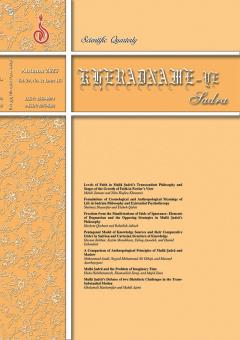Pentagonal Model of Knowledge Sources and their Comparative Order in Sadrian and Cartesian Structure of Knowledge
Subject Areas : Studies on Mulla Sadra and the Transcendent Philosophy
Hassan Rahbar
1
*
![]() ,
Kazim Mosakhany
2
,
Eshaq Asoodeh
3
,
Hamid Eskandari
4
,
Kazim Mosakhany
2
,
Eshaq Asoodeh
3
,
Hamid Eskandari
4
1 - Assistant Professor, Islamic Philosophy and Wisdom Department, University of Sistan and Baluchestan, Zahedan, Iran
2 - Assistant Professor, Theology Department, Gonbad Kavous University, Gonbad Kavous, Iran
3 - Assistant Professor, Department of Islamic Teachings, Jahrom University, Jahrom, Iran
4 - Assistant Professor, Islamic Philosophy and Wisdom Department, University of Sistan and Baluchestan, Zahedan, Iran
Keywords: sources of knowledge, sense perception, reason, introspection, testimony, memory, Mullā Ṣadrā, Descartes,
Abstract :
Epistemology, which deals with the possibility, whatness, sources, and realm of knowledge, bases one of its most important principles on discovering Man’s sources of knowledge. Contemporary epistemologists refer to five sources of knowledge for human beings: sense perception, reason, introspection, testimony, and memory. Descartes, as a philosopher of the Western world, and Mullā Ṣadrā, as a philosopher of the world of Islam, have provided some theories regarding the problem of knowledge, particularly its sources. Their views are compatible with the pentagonal model proposed by cotemporary epistemologist in this respect. Mullā Ṣadrā and Descartes believe that knowledge acquisition begins with sense perception and ends in reason. Nevertheless, the difference is that, although reason in the Transcendent Philosophy is the last level of perception, it does not mark the end of the way, and it is intuition-based introspection that ends the acquisition of true knowledge. In the cognitive schools of Mullā Ṣadrā and Descartes, sense perception, intellect, and introspection are responsible for producing knowledge, testifying to its transfer, and functioning as social and general sources of knowledge, and memory is responsible for maintaining and safekeeping of knowledge.
دکارت، رنه (1364) اصول فلسفه، ترجمۀ منوچهر صانعي درهبيدي، تهران: آگاه.
دکارت، رنه (1369) تأملات در فلسفه اولی، ترجمۀ احمد احمدی، تهران: مرکز نشر دانشگاهی.
دکارت، رنه (1372) قواعد هدایت ذهن، ترجمۀ منوچهر صانعی درهبیدی، تهران: دانشگاه شهید بهشتی.
دکارت، رنه (1384) اعتراضات و پاسخها، ترجمۀ علی موسائی افضلی، تهران: علمی و فرهنگی.
سبزواری، ملاهادی (1379) شرح منظومه، تصحیح حسن حسنزاده آملی، تهران: نشر ناب.
عبودیت، عبدالرسول (1386) درآمدی به نظام حکمت صدرایی، ج2، تهران: سمت.
عبودیت، عبدالرسول (1388) درآمدی به نظام حکمت صدرایی، ج1، تهران: سمت.
مظفر، محمدرضا (1378) منطق، ج2، ترجمه علی شیروانی، قم: دار العلم.
ملاصدرا (1378) التنقیح فی المنطق، تصحيح و تحقیق غلامرضا یاسیپور، مقدمه احد فرامرز قراملکی، تهران: بنیاد حکمت اسلامی صدرا.
ملاصدرا (1380) الحکمة المتعالیة فی الأسفار الأربعة، ج2، تصحیح و تحقیق مقصود محمدی، تهران: بنیاد حکمت اسلامی صدرا.
ملاصدرا (1381) رساله سه اصل، تصحیح و تحقیق سیدحسین نصر، تهران: بنیاد حکمت اسلامی صدرا.
ملاصدرا (1382الف) الحکمة المتعالیة فی الأسفار الأربعة، ج9، تصحیح و تحقیق رضا اکبریان، تهران: بنیاد حکمت اسلامی صدرا.
ملاصدرا (1382ب) المبدأ و المعاد، تصحیح و تحقیق محمد ذبیحی و جعفر شاهنظری، تهران: بنیاد حکمت اسلامی صدرا.
ملاصدرا (1383الف) الحکمة المتعالیة فی الأسفار الأربعة، ج3، تصحیح و تحقیق مقصود محمدی، تهران: بنیاد حکمت اسلامی صدرا.
ملاصدرا (1383ب) الحکمة المتعالیة فی الأسفار الأربعة ، ج8، تصحیح و تحقیق علی اکبر رشاد، تهران: بنیاد حکمت اسلامی صدرا.
ملاصدرا (1384) شرح الاصول الکافی، ج1، تصحیح و تحقیق رضا استادی، تهران: بنیاد حکمت اسلامی صدرا.
ملاصدرا (1386الف) ایقاظ النائمین، تصحیح و تحقیق محمد خوانساری، تهران: بنیاد حکمت اسلامی صدرا.
ملاصدرا (1386ب) مفاتیح الغیب، تصحيح و تحقيق نجفقلي حبيبي، تهران: بنیاد حکمت اسلامی صدرا.
ملاصدرا (1389) اسرار الآیات و انوار البینات، تصحيح و تحقيق محمدعلی جاودان، تهران: بنياد حکمت اسلامي صدرا.
ملاصدرا (1393) شرح الهدایة الاثیریة، تصحیح و تحقیق مقصود محمدی، تهران: بنیاد حکمت اسلامی صدرا.
نیکزاد، عباس (1386) عقل و دین از دیدگاه ملاصدرا و برخی فیلسوفان صدرایی، قم: امیرکبیر.
Audi, R. (1998). Epistemology; a contemporary introduction to the theory of knowledge. London: Routledge.
Jolley, N. (1998). The light of the soul: theories of ideas in Leibniz, Malebranche and Descartes. New York: Oxford University Press.
Kemp Smith, N. (1958). Descartes philosophical writings. New York: the Modern Library.
Mason, R. (1997). The God of Spinoza. New York: Cambridge University Press.
Pollock. J. L. & Cruz, J. (1999). Contemporary theories of knowledge. 2nd Edition. Rowman & Littlefield Publishers.
Pundik, A. (2006). Epistemology & the law of evidence: four doubts about Alex Stein’s foundations of evidence law. SSRN Electronic Journal, DOI:10.2139/ssrn.942635
Scruton, R. (2002). A short history of modern philosophy. London: Routledge.

